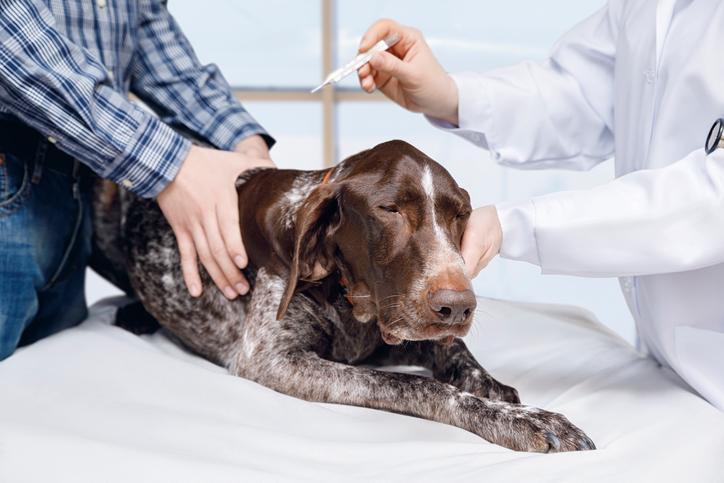My Dog's Breathing is Fast and Shallow



See files for Dogs
On hot days or if they have just completed exercise, it is normal for a dog to breathe short and fast. They are breathing in to balance their body temperature and ensure they have enough oxygen to recover. This is a normal physiological process. However, accelerated breathing can have a pathological origin, something we explain further in this AnimalWised article.
If you notice that your dog's breathing is fast and shallow, there are a few possible causes. Heart problems, lung infections, poisoning or heat stroke could all be at fault. Some of these problems can be exacerbated by conditions such as dehydration or genetic predispositions to respiratory problems. Keep reading to learn more about these causes and what you can do about them.
My dog is breathing fast - causes
If we get the impression that our dog's breathing is labored, shallow or faster than normal, we need to confirm this is actually the case. A dog's normal breathing range is between 10 and 30 breaths per minute. A higher respiratory frequency can put us on alert, but we also need to look at the context. If the dog's fast breathing occurs after they have just exercised or if they are particularly hot, it may not imply a physiological health problem.
However, other circumstances are not as benign. If your dog is breathing fast when at rest, it is a greater indication of a problem. Shallow breathing has many underlying causes, but we need to look at other symptoms to see what may be the problem. On the other hand, if the dog is breathing fast, but acting normal without any other obvious signs, it may be due to:
- Fever: during the initial stages of various diseases, fever may develop. Other symptoms may not present until the underlying pathology progresses.
- Pain: the origin of a dog's pain is equally not always evident. For example, a fracture may not be observed while the dog is lying down, but the pain causes the dog's breathing to become fast.
- Anxiety: anxiety and stress in dogs can also manifest in rapid, shallow breathing.
When you find your dog breathing fast and shallow, but otherwise seems normal, you will need to take them to the veterinarian. They will be able to run proper diagnostic tests to determine the cause of fast breathing. You should also provide any additional information related to the faster breathing. This way the veterinarian can have a better idea of where to start. Next, we look at the other symptoms which may explain agitated breathing in dogs.
My dog is breathing fast while lying down
Sometimes we may see our dog not only breathes fast and shallow, but they struggle even to get up. When a dog is lying down, they should be at rest, meaning their breathing should be at a normal level. It may even be slower thanks to their reduced activity. However, if your dog has rapid breathing, look out for the following concurrent symptoms:
- Struggling when getting up
- Coughing
- Loss of appetite
- Weight loss
- Fluid accumulation
- Mucus membrane coloration
These symptoms heavily imply the dog may be suffering from congestive heart disease. In severe cases, the dog's mucus membranes may turn blue. This malfunctioning of the heart may also affect the dog's breathing.
Part of the reason for the dog breathing quickly is due to the poor circulation of blood around the body. This is what leads to the aforementioned symptoms. Immediate veterinary treatment is necessary to confirm diagnosis. Congestive heart failure in dogs is incurable, but the symptoms can be managed. Dietary restrictions and medication can be used to improve longevity.
In severe cases, heart failure can lead to pleural effusion, an accumulation of serous fluid or blood in the chest. It is an extremely serious clinical situation which compromises the dog's breathing, making it a veterinary emergency. If you suspect your dog may be suffering from heart problems, this article on canine dilated cardiomyopathy may be helpful.

My dog is breathing fast and shaking
If a dog is breathing fast and shallow, we should consider poisoning. Since dogs are not always the most discriminate when they eat, it is possible they may ingest a toxic substance accidentally. Intoxication in dogs can cause rapid and shallow breathing, as well as:
- Shaking
- Hypersalivation
- Vomiting
- Dizziness
- Nervousness
- Hyperactivity
- Diarrhea
If we think the dog has eaten something they shouldn't have, we should look for any signs in the environment. For example, are there are any nearby leaves of a plant which is toxic to dogs? Other poisonous substances which the dog may eat can include detergents, insecticides, rodenticides, medications, food or other plants. You will not always find evidence if the dog has consumed it all or they found it somewhere outside.
When we have observed the above symptoms, you will need to take the dog to a veterinarian. Treatment may involve pumping the dog's stomach, fluid therapy and more. The quantity of toxic substance can affect the severity of the symptoms, as can the size of dog and their general state of well-being at the time of consuming the poison. Acute cases of poisoning can result in an increased respiratory rate and anaphylactic shock which can be accompanied by shaking.
Other causes of fast and shallow breathing in dogs
There are other reasons for respiratory problems in dogs which lead to fast and shallow breathing. They may be related to other pathologies, but they may also be the direct cause of the problem. They include:
- Pneumonia: apart from an increased breathing rate, pneumonia may also result in fever, a runny nose, coughing or a bluish coloration of the mucous membranes thanks to a lack of oxygen. If this clinical picture is maintained, breathing may become so restricted the dog's lungs collapse. The cause of pneumonia may be a virus, bacteria, fungus or even parasites. Such disparate causes means veterinary diagnosis is essential.
- Heat stroke: this is another serious cause of fast breathing in dogs. Often due to being in the sun too long, heat stroke is caused by a dramatic increase in body temperature. If not addressed, the problem can become fatal. This is one reason we need to be careful of dogs with thick coats in warm climates.
- Dehydration: this occurs when more fluids in the dog's body are lost than replenished. The dog's breathing becomes fast and shallow, their eyes take on a sunken appearance, their mouth dries up and their gums become sticky. Veterinary assistance is required to stabilize the dog, often requiring fluid therapy.
- Shock: hemorrhages, heart problems, allergic reactions, severe dehydration, poisoning or generalized infections can lead to a state of shock. Shock causes serious risk to the dog's life and faster or laboured breathing is one of the first signs.

What happens when a dog is breathing fast and shallow?
When a dog's breathing becomes fast and shallow for reasons other than natural ones, it is not a good sign. This is especially the case with brachycephalic dog breeds such as Boxers, Bulldogs and Pugs (see video below). These are dogs with a morphology conducive to respiratory problems. You may notice it particularly as the dog's breathing is faster when sleeping. However, if any dog's breathing becomes too fast, you will need to find out the underlying cause by visiting a veterinarian.

This article is purely informative. AnimalWised does not have the authority to prescribe any veterinary treatment or create a diagnosis. We invite you to take your pet to the veterinarian if they are suffering from any condition or pain.
If you want to read similar articles to My Dog's Breathing is Fast and Shallow, we recommend you visit our Other health problems category.
1. Carlson, D. G., & Giffin, J. M. (2002). Practical Canine Veterinary Manual. Madrid: Editorial el Drac.







